Text
Subtext in Guardian: An Analysis
What is Guardian?
What is subtext?

There are subtext in Guardian which is universal and easily understood, but what I would like to explore are the subtext meaningful to Chinese culture and context.
(Caveat: As I am not (by any means) a scholar on Chinese culture, I may make mistakes from time to time. If so, I welcome concrit. Note, I am not saying that these subtext/tropes are limited to Chinese culture.)
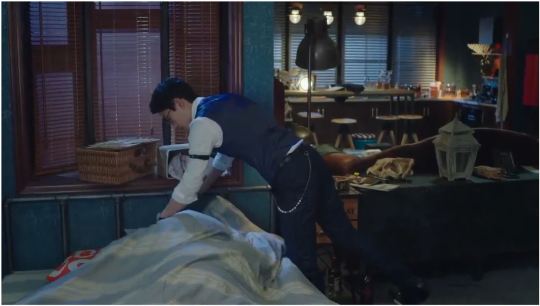
I will not be mentioning certain things, such as Shen Wei taking care of Zhao Yunlan while he is sick etc, because these seem to be pretty universal.
The Setting
Firstly, it is important to understand the setting of this entire scene. It is set in Zhao Yunlan’s home. In Chinese culture, the home is a space largely reserved for people who are considered close family members. Even if friends (or distant relatives) are invited to visit, there are also certain boundaries and formalities to be observed.
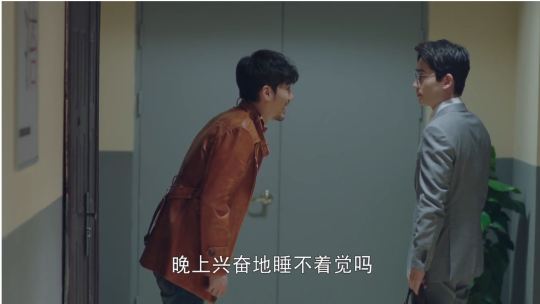
Therefore, it is also interesting to note that, at this point in the show, Shen Wei is only an intriguing acquaintance to Yunlan, and a neighbor who recently moved in.
In light of this context, I am going to discuss the following.
1. Staying The Night (without an invite)
The boundaries between friends in the home are as follows: if you brought a buddy to his doorstep, that’s basic courtesy in helping a friend. If you are thoughtful, you might make sure that they are in bed (which is great material for some h/c fic). In line with friendly boundaries, you would leave soon after.

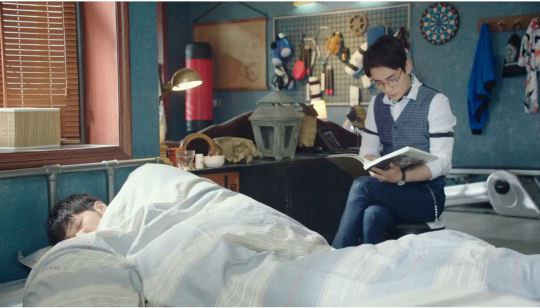
However, Shen Wei stayed the whole night.

(Yunlan is also incredulous and skeptical about this, as he asks if Shen Wei watched over him the whole night.)
As mentioned earlier, friends who enter a home have certain boundaries and formalities to observe. Staying over is not something as simple as crashing on a friend’s sofa. In Chinese culture, you would only stay over at a person’s place if you consider them to be as close as family. And you would only watch over people who you consider to be family.
The act of staying and watching over Yunlan for the whole night, shows us that Shen Wei views himself being as close as a member of Yunlan’s family.
2. Organizing Zhao Yunlan’s Apartment
During his stay, Shen Wei spent his time to organizing Yunlan’s apartment.
Given that the home is a space that is reserved for family, this usually means that guests do not usually touch objects within a home; it is handed to them. Unless you are close friends with someone, you would never go into a home and casually pick up an object, especially if it is the first time you went to the person’s place. It is a form of politeness, something that Shen Wei prides himself in.


You can see this in Shen Wei’s and Yunlan’s interaction, when Shen Wei was looking for the medication. He asked Yunlan where he could find the medication. Only after Yunlan told him that the medicine was in the refrigerator, that he opened and went through it.
However, in organizing Yunlan’s home, touching and moving objects to where Shen Wei considers them to be their rightful place, Shen Wei shows that he does not see himself as merely an acquaintance or even a casual friend.

Shen Wei was also shown folding Yunlan’s clothes. Laundry is not something causally done in general (even among close friends), much less male friends. This action is transgressing the boundary of not only the neighborly acquaintance that Shen Wei and Yunlan share on the surface, but also non-romantic male friendship as well.
Also, the closer an item is to your body, the closer you would have to be with the owner to touch and care for it. This is why Shen Wei folding Yunlan’s clothes is considered to be quite an intimate activity.
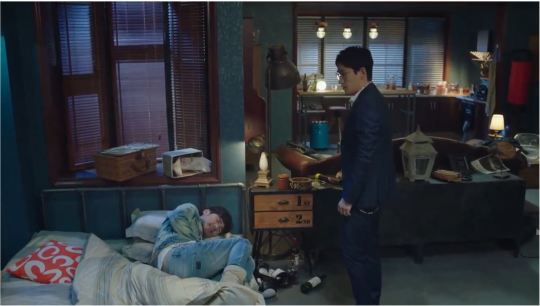
(before)
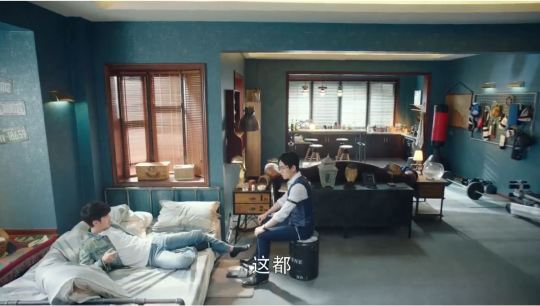
(after)
The fact that Shen Wei organised the entire space, while Yunlan was asleep and unconscious, is an action that transgresses a friendship boundary. Together with the details of the entire scene, the action is very much romantic.
Later in the scene, Shen Wei states that he organised the space as a gesture of thanks for Yunlan saving him from the hooligans in the street. This makes no sense at all, as there is no Chinese cultural context for this action. Typically, if someone saves your life, you would treat them to a meal or help them with some task. In extreme cases, you might become sworn brothers and protect each other for life.
But to organize and clean up a space as thanks for saving a life? It only happens if you pledge your life to each other as a romantic couple, for male-female relationships. And for Shen Wei to exhibit this behavior, this action is meant to come across as romantic subtext.
3. Cooking
Cooking for a romantic partner is a very common trope in Chinese (and Asian) media in general. It is something created with love and effort, a provision of nutrition and energy to take on the day, or comfort at the end of a hard day.
This piece of subtext does not stand on its own, in the Chinese cultural context, unlike the previous 2. We have to take into consideration of the fact it is a trope, and how it plays into this trope. Between of the 2 person environment, atypical behavior between male friends, and the cooking, this turns into romantic subtext.

The provision of food is very much linked to being part of the family, especially if you are in the home environment. To make food for the someone, is to demonstrate the depth, time and effort you would spend on this person. The dish that Shen Wei cooks is porridge, which takes time and effort.
As this is a well-recognized romantic trope, and as this behavior is atypical between 2 male persons in Chinese culture, it conveys a romantic context instead. This is further emphasized because of the 2-person setting as well.
Shen Wei demonstrates the depth of affection for Yunlan by cooking for him.
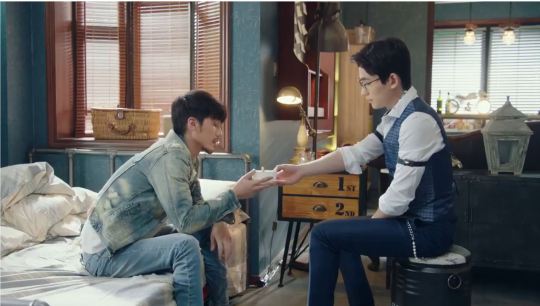
Furthermore, while Yunlan eats the porridge, Shen Wei says that if Yunlan wants to eat porridge, he find Shen Wei next door at anytime and Shen Wei will cook it for him. This re-emphasizes the cooking in a romantic context, because causal cooking between 2 persons is usually between lovers.
(A thing to note: The author’s intention in the original novel is to have Shen Wei as a top and Yunlan as bottom. However, as Shen Wei does not exhibit typical alpha male behavior, and he engages in things like cooking - traditionally the role of the female character, this has led to drama fans viewing Shen Wei as the bottom instead. I personally have no preference in fandom couples for top/bottom, but I am fascinated to see this general discrepancy between drama fans and novel fans.)
4. 沈巍啊 沈巍 你说你这么好 要我怎么舍得放手
Zhao Yunlan says this, right after he takes the bowl of porridge from Shen Wei.
Shen Wei ah, Shen Wei, you are such a good person (to me), how could I bear to let you go?

The key word/phrase here is the use of the word “bear”. In the original Chinese text, the word used is 舍得. While the literal direct translation is “willing”, 舍得 conveys a feeling of reluctance in having to give something up / to sacrifice something, rather than about the willingness to do so. Thus the use of the word “bear” is more suitable.
To use this phrase 舍得, in reference to a person, is to also convey a sense of thought about this person. This person must be viewed as someone who is precious and important to you, and for them to not be by your side would be considered as a sacrifice.
Thus, this phrase is used only for people whom you are very close to, those you feel would be a sacrifice if you had to give them up. Taking into the context of Chinese drama tropes as well, among similar aged characters, it is most often a romantic sentiment between lovers, especially in the context of letting someone go.
To let someone go (放手), there are many situations. A parent sending a child to war, a cop letting a criminal off, a master allowing a servant to leave the family. But, when you combine the phrase of 舍得 with letting someone go, it becomes a very specific context as a well-recognized romantic trope.

The tone is also important here, as Zhao Yunlan’s tone can either be serious, or, at the very least, flirtatious teasing. This sentence was not played for laughs, and we didn’t get a no homo statement after Yunlan said this. Novel!Yunlan would probably be serious with this sentence (given that he bought a home for Shen Wei, even before Shen Wei agreed to go out with him). For drama!Yunlan, this is probably flirtatious teasing, which romantic in nature.
5. 这件事情 等我回来之后再说吧
As Yunlan tries to get Shen Wei to join SID as a consultant, he lays casually in bed.

Then, Shen Wei says the following sentence,
For this matter, let us discuss this after I return
This statement, in the setting of a home, is very classic of a domestic Chinese couple. It is a common statement between couples when they have a difference of opinion or if further discussion is needed, usually at breakfast before the start of a busy day.
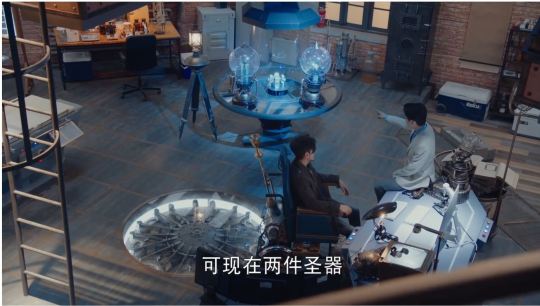
If Shen Wei and Yunlan had a disagreement about work, and this statement was said at the SID, it would be taken in a work context. However, as it is said in Yunlan’s apartment, thus, this brings out the romantic subtext of the statement.
Also, Shen Wei simply says, when I return. He does not state the location he returns to, and since he is in Yunlan’s place, his statement also implies that he will be returning to Yunlan’s apartment, which further strengthens the romantic subtext.

Furthermore, Yunlan’s response to this statement is a casual 好啊 (meaning okay), in acceptance of Shen Wei’s request to delay this conversation. This casual agreement denies none of the above romantic implications, and indeed, they do resume this conversation in a home at a later time, in Shen Wei’s apartment.
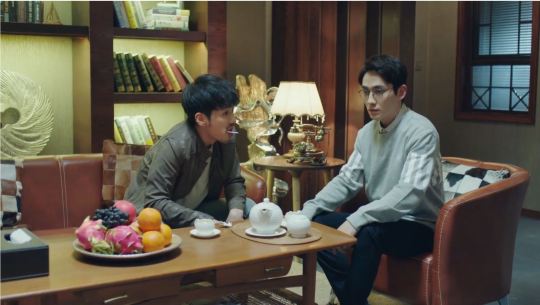
Hopefully, this analysis has been insightful and useful to the Guardian’s fandom, providing further understanding of Chinese culture and context inherent in the interactions between Shen Wei and Zhao Yunlan.
I do have plans to do other scenes, so keep a lookout for them if you are interested!
17 notes
·
View notes
Photo










ANDWEBEGIN’S FAVOURITE GUARDIAN MOMENTS:
I’ll listen to you from now on, alright?
207 notes
·
View notes






